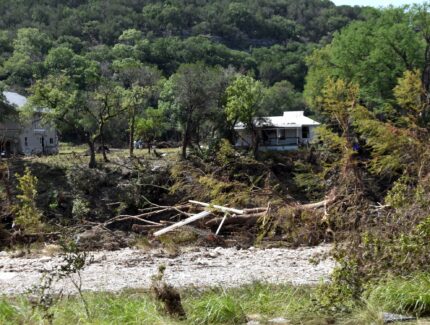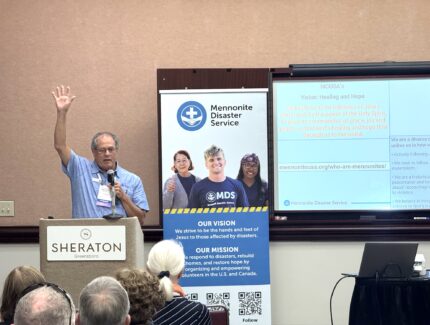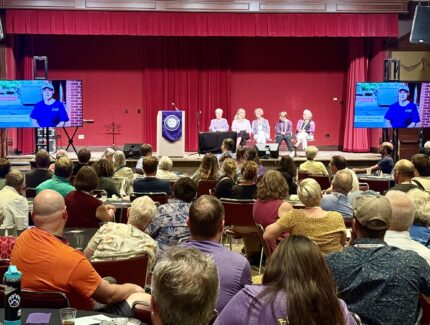
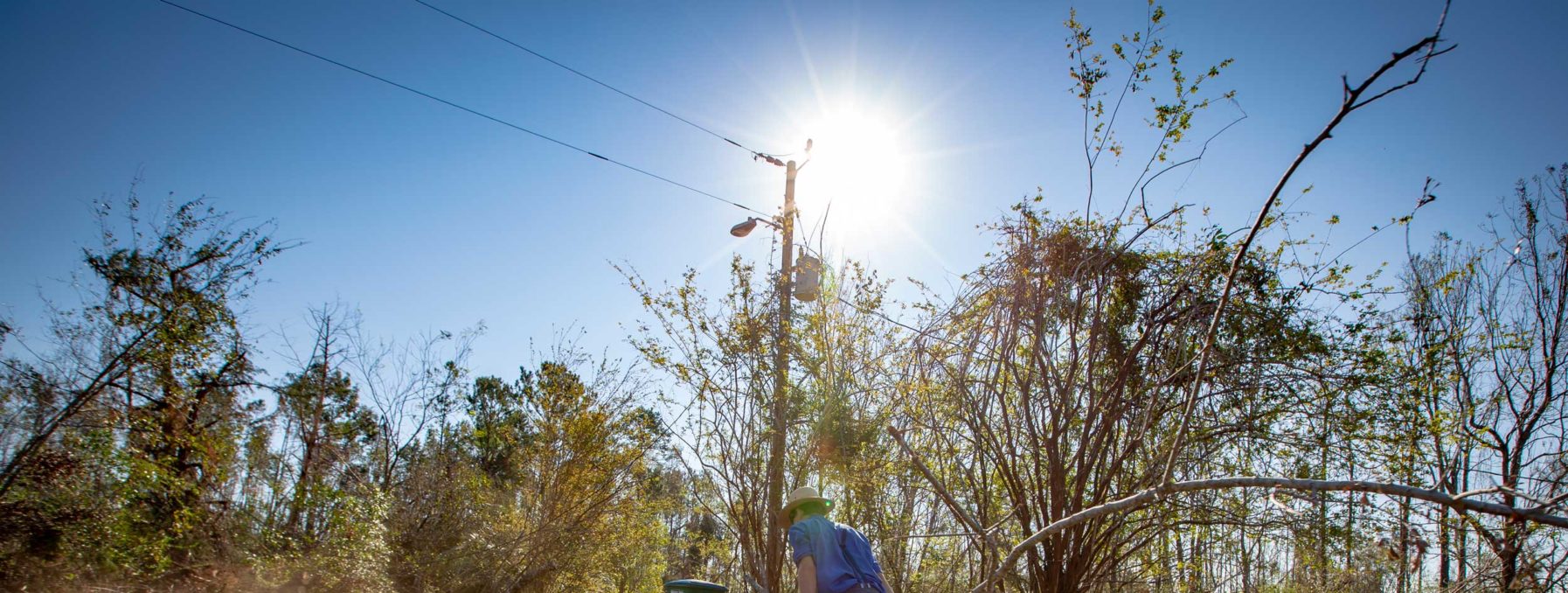
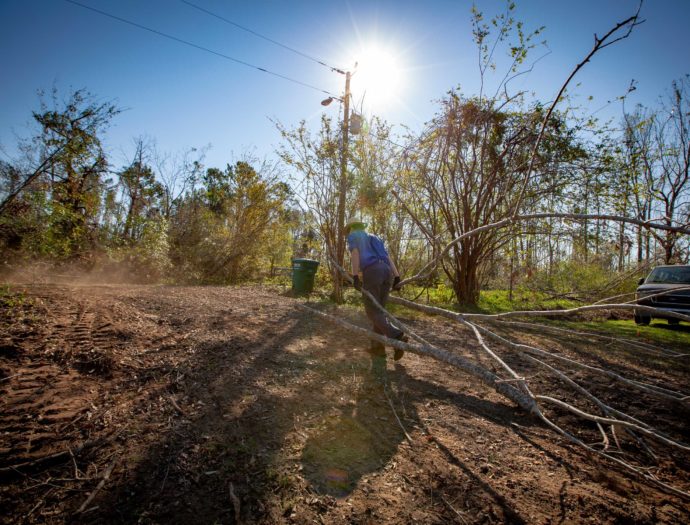
January 19, 2021
“How long, oh Lord?”
With love and resilience, Mennonite Disaster Service volunteers adapt to the times
When Josh Carson talks with Mennonite Disaster Service (MDS) volunteers over the phone, he hears them struggle to discern their path of service amid the COVID-19 pandemic.
“I hear them lament that things are so different,” said Carson, who, as MDS volunteer coordinator for leadership, works closely with MDS volunteers who stay at worksites for months at a time: project directors, office managers, crew leaders, RV volunteers, cooks.
“Like the opening verse of Psalm 13, they ask ‘How long, oh Lord?’” he said. “MDS volunteers love serving. They’re so excited to get back out there, and many of them are frustrated that serving is not so simple right now.”
MDS projects in the U.S. completely shut down for the first time in March due to COVID-19. Since then, U.S. volunteers have faced delayed project starts, early shutdowns, and new safety precautions on MDS job sites.
In Canada, all MDS projects were suspended, except for a couple of clean-ups in spring and a small RV-like COVID-19-compliant project in B.C. At the same time, the closing of the Canada -U.S. border prevented Canadians from going south to volunteer.
Now, more than ever, when volunteers decide whether to serve, the pandemic causes them to make the decision with their families, churches and communities. “I applaud volunteers for their serious discernment and reflection,” said Carson.
Behind-the-scenes during COVID-19
The decisions around shutting or opening projects are not made lightly or easily.
“Canceling volunteer service is one of the last things we ever want to do, and it’s something that is really difficult for MDS,” said Jerry Grosh, MDS field operations manager.
Volunteers trust MDS to provide meaningful work and a good experience, he said, adding that a “good experience”—amid a pandemic or not—means a safe one. MDS has always observed stringent work safety protocols, but COVID-19 has required a whole new level of thinking to stay in line with shifting guidelines from health and government officials.
“We realize it’s disruptive and it’s difficult—for everyone,” said Grosh. “It’s not only hard for volunteers, it’s hard for the people we’re trying to help.”
In trying to keep volunteers safe, it has been painful to acknowledge that some homeowners are in turn living in less safe surroundings because they’re unable to get back home, he said.
“There are some very sad trade-offs,” said Grosh. “This is not ideal for anyone. We all want to get out there and do what we do.”
Telling volunteers they can’t “go and do for others” has also been hard work for those whose jobs entail delivering that sad message.
As Deanna Frey, MDS coordinator for weekly volunteers, puts it: “It’s the exact undoing of my job.”
Frey said most volunteers aren’t too surprised when she calls them with a message of cancellation or delay.
“Volunteers are eager to help the families that we are serving, and right now that means staying at home until it is safer for everyone to return,” said Frey.
Becky Gochnauer, MDS volunteer manager, agreed that volunteers have responded well. But watching their faces—often on Zoom calls as they received the news—was difficult.
“You see in their eyes,” said Gochnauer. “You hear their words: that this is the right decision. But they struggle to get their head and their heart to agree. It has been so hard seeing the faces: the disappointment, the sadness, the resignation.”
In some ways, it was a year of watching COVID-19 win—again and again.
“Volunteers were facing the fact that the virus had yet again taken something away and was dictating the way they lived their lives,” said Gochnauer.
COVID silver linings?
As MDS looks forward to a brighter 2021, MDS staff are also processing what lessons they’ve learned and how those might translate into best practices for the future.
For those who have been fortunate enough to get through their lives without being affected by a major disaster, COVID-19 certainly helped them understand the sense of helplessness disaster survivors often describe.
Now, as projects look to reopen, MDS is finding that volunteers still want to serve. Or, as Gochnauer put it, “they’ve hung onto hope.” What’s more, they’re willing to go back to the job sites knowing that the MDS experience has changed—possibly forever.
“We can have volunteers at our projects getting disaster survivors home,” insisted Gochnauer. “It’s just different. We want to serve these homeowners but in order to do that we have to provide a safe environment for everybody.”
Already, she has witnessed volunteers who travel to job sites, proceed to follow MDS’s COVID-19 safety guidelines, and return home with memories of a good experience.
“There is an element of grace in those volunteers,” she said—and clearly it’s the kind of grace that’s coupled with being educated and informed about COVID-19.
The flexibility and creativity of MDS volunteers has kept Carson, Grosh, Frey, and Gochnauer coming back to their jobs, even knowing they’re going to face difficult days.
“I keep my hopes up by seeing the love of Jesus in the volunteers who choose to stay home, caring for themselves and serving others safely in their home communities through their local MDS unit or elsewhere,” said Carson.
“I also see the love of Jesus in those who choose to serve on MDS projects, doing so safely and with great compassion. I’m particularly encouraged by the flexibility and creativity of MDS volunteers during these times!”

